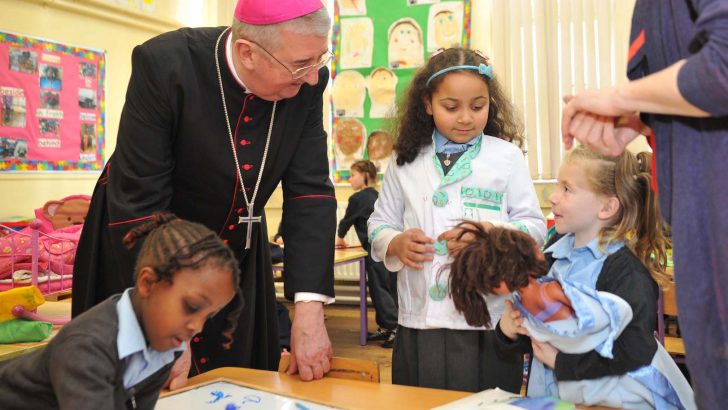Has Education Minister, Richard Bruton, yet said something that is friendly and supportive of the role and place of faith schools in Irish society? Much of the time Minister Bruton sounds like a spokesman for Equate, the pressure group that campaigns against the rights of faith schools in the name of ‘equality’.
Minister Bruton gives a very strong impression that, at bottom, he takes a dim view of the role of faith-specific education in our schools. Aside from the fact that he does not publicly voice support for such schools (or if he does, it is so muted as to be effectively silence), he is sponsoring a law that will undermine the right of Catholic schools to admit Catholic children first in the event of over-enrolment, while maintaining the right of Protestant and other minority-faith schools to do so.
Now he has said he supports a move by the dozen state-run primary schools in Ireland to bring a halt to preparation for First Holy Communion and Confirmation during school hours.
These schools come under a body called the Education and Training Boards (ETB). Minister Bruton was speaking at an ETB conference last week and he said that while he had not been formally notified of the move, he welcomed it.
Successor
The ETBI is the successor organisation of the VEC (Vocational Education Committee). There have been VEC secondary schools for years but not VEC primary schools. The first VEC (now ETB) primary schools in the country were opened in 2008. The ETB is a state body meaning these schools are also the first primary schools in the country to be state-run.
As this sector is going to expand over time, the question of how religion will be taught in them is a very important issue.
At first there was an agreement that children would be taught in their own specific faiths during school hours. For the most part, children would be taught a common religion subject using a text book called Goodness Me, Goodness You, but at other times the children would separate and receive instruction in their own faiths. This would include sacramental preparation.
But from the outset some parents, allied with some journalists, and presumably some members of the ETB itself, did not like this arrangement and have sought to undermine it. It has been presented as ‘divisive’ and a form of ‘segregation’, a loaded term if ever there was one conjuring up as it does images of the Deep South during the days of enforced racial segregation, or Apartheid South Africa for that matter.
Using a word like ‘segregation’ means we lose sight completely of the voluntary nature of how RE was being taught in the ETBs. It was up to parents to decide whether or not they wanted their children to receive instruction specific to their own faith, and that is how it should be. Parents are the primary educators of their children, a right that is recognised by our Constitution.
System
The various media liked to speak only to parents who objected to this system. They did not speak to parents who are perfectly happy with it. This skewed presentation of the issue has amounted to fake news.
Ending sacramental preparation in state schools during school time seems to be a precursor to doing away with separate religious instruction entirely during the school day, which means that these schools will no longer support parents who want their children to receive faith-specific lessons during school time. Those parents will have to make arrangements of their own.
These parents will take note that state-based primary schools are unsupportive towards them. It means that given a choice between a state-run and a Church-run primary school they will be more likely, not less, to choose the Church-run school over the state-run one.
This will have an ironic effect, because the aim of these state-run schools is obviously to promote communal cohesion. They want to see all children educated in the same kind of one-size-fits-all school system, one that minimises parental choice in the name of ‘equality’. However, the upshot could be that many parents resist sending their children to them because they will not like the way they teach religion.
This appears to be the reasoning behind a suggestion in 2008 by the National Union of Teachers (NUT) in Britain that state-run schools should consider allowing faith-specific lessons during school time if need be.
The NUT (no friend of faith-schools in general, let it be noted), was concerned that not having faith-specific RE during school time might drive religious parents out of the state system and into the faith system.
This would disproportionately mean Hindu and Muslim parents withdrawing their children from state schools since Hindus and Muslims tend to be more religious than the native British population which is now very secular. But these minorities are precisely the ones that need integrating and therefore are precisely the ones whose children should be going to state-run schools. So the thinking goes anyway.
Therefore, the decision by the ETBs, with the backing of the Education Minister, could turn out to be very short-sighted. If state-schools appear to be suspicious of religion and insist that faith-specific RE take place only outside school hours, then religious parents will be less likely, not more likely to send their children to those schools.
It would be far better if the ETBs took a more sympathetic approach to religious parents and listened rather less to parents, journalists and other parties who are antagonistic towards faith-based religious education.


 David Quinn
David Quinn Photo: Clodagh Kilcoyne
Photo: Clodagh Kilcoyne 